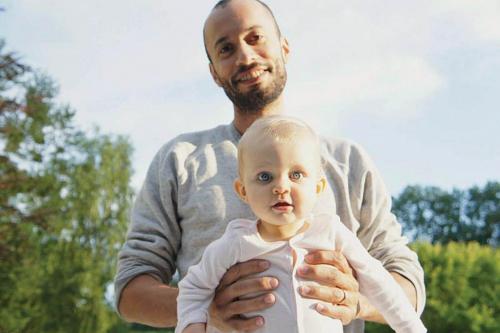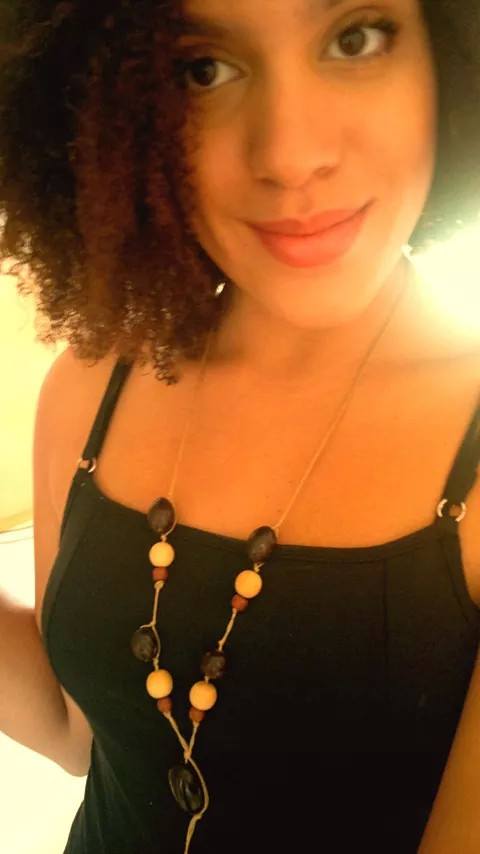Black and Blue and Blond
Virginia Quarterly Review
Volume 91, Number 1 (Winter 2015)
pages 80-87
Thomas Chatterton Williams

The author and his daughter at her great-grandmother’s house in Normandy, 2014.
Where does race fit in the construction of modern identity?
In 1517, Fray Bartolomé de las Casas, feeling great pity for the Indians who grew worn and lean in the drudging infernos of the Antillean gold mines, proposed to Emperor Charles V that Negroes be brought to the isles of the Caribbean, so that they might grow worn and lean in the drudging infernos of the Antillean gold mines. To that odd variant on the species philanthropist we owe an infinitude of things…”
—Jorge Luis Borges, “The Cruel Redeemer Lazarus Morell”
“But any fool can see that the white people are not really white, and that black people are not black.”
—Albert Murray, The Omni-Americans
“Our white is so white you can paint a chunka coal and you’d have to crack it open with a sledge hammer to prove it wasn’t white clear through.”
—Ralph Ellison, Invisible Man
There is a millennia-old philosophical experiment that has perplexed minds as fine and diverse as those of Socrates, Plutarch, and John Locke. It’s called Theseus’s Paradox (or the Ship of Theseus), and the premise is this: The mythical founding-king of Athens kept a thirty-oar ship docked in the Athenian harbor. The vessel was preserved in a sea-worthy state through the continual replacement of old timber planks with new ones, piecemeal, until the question inevitably arose: After all of the original planks have been replaced by new and different planks, is it still, in fact, the same ship?
For some time now, a recurring vision has put me in mind of Theseus and those shuffling pieces of wood. Only, it’s people I see and not boats: a lineage of people distending over time. At the end of the line, there is a teenage boy with fair skin and blond hair and probably light eyes, seated at a café table somewhere in Europe. It is fifty or sixty years into the future. And this boy, gathered with his friends, is glibly remarking—in the dispassionate tone of one of my old white Catholic school classmates claiming to have Cherokee or Iroquois blood—that as improbable as it would seem to look at him, apparently he had black ancestors once upon a time in America. He says it all so matter-of-factly, with no visceral aspect to the telling. I imagine his friends’ vague surprise, perhaps a raised eyebrow or two or perhaps not even that—and if I want to torture myself, I can detect an ironic smirk or giggle. Then, to my horror, I see the conversation grow not ugly or embittered or anything like that but simply pass on, giving way to other lesser matters, plans for the weekend or questions about the menu perhaps. And then it’s over. Just like that, in one casual exchange, I see a history, a struggle, a whole vibrant and populated world collapse without a trace. I see an entirely different ship…
…I realize now that this vision of the boy from the future I’ve had in my head for the past year traces itself much further back into the past. It must necessarily stretch back at least to 1971, in San Diego, where my father, who was—having been born in 1937 in Jim Crow Texas—the grandson of a woman wed to a man born before the Emancipation Proclamation, met my mother, the native-Californian product of European immigrants from places as diverse as Austria-Hungary, Germany, England, and France. This unlikely courtship came all of four years after the Loving v. Virginia verdict repealed anti-miscegenation laws throughout the country. In ways that are perhaps still impossible for me to fully appreciate, their romance amounted to a radical political act, though now, some four decades on, it seems a lot less like any form of defiance than like what all successful marriages fundamentally must be: the obvious and undeniable joining of two people who love and understand each other enormously.
But that’s not the beginning, either. This trajectory I now find myself on no more starts in San Diego than in Paris. Not since it is extremely safe to assume that my father, with his freckles, with his mother’s Irish maiden name, and with his skin a shade of brown between polished teak and red clay, did not arrive from African shores alone. As James Baldwin, perspicacious as ever, noted of his travels around precisely the kind of segregated Southern towns my father would instantly recognize as home, the line between “whites” and “coloreds” in America has always been traversed and logically imprecise: “the prohibition … of the social mingling [revealing] the extent of the sexual amalgamation.” There were (and still are): “Girls the color of honey, men nearly the color of chalk, hair like silk, hair like cotton, hair like wire, eyes blue, gray, green, hazel, black, like the gypsy’s, brown like the Arab’s, narrow nostrils, thin, wide lips, thin lips, every conceivable variation struck along incredible gamuts…” Indeed, to be black (or white) for any significant amount of time in America is fundamentally to occupy a position on the mongrel spectrum—strict binaries have always failed spectacularly to contain this elementary truth.
And yet in spite of that, I’ve spent the past year trying to think my way through the wholly absurd question of what it means for a person to be or not to be black. It’s an existential Rubik’s Cube I thought I’d solved and put away in childhood. My parents were never less than adamant on the point that both my older brother and I are black. And the in many ways simpler New Jersey world we grew up in—him in the seventies and eighties, me in the eighties and nineties—tended to receive us that way without significant protest, especially when it came to other blacks. This is probably because, on a certain level, every black American knows what, again, Baldwin knew: “Whatever he or anyone else may wish to believe… his ancestors are both white and black.” Still, in the realm of lived experience, race is nothing if not an improvisational feat, and it would be in terribly bad faith to pretend there is not some fine, unspoken, and impossible-to-spell-out balance to all of this. And so I cannot help but wonder if indeed a threshold—the full consequences of which I may or may not even see in my own lifetime—has been crossed. (It’s not a wholly academic exercise, either, since my father was an only child and in the past year my brother married and had a daughter with a woman from West Siberia.)…
Read the entire article here.

